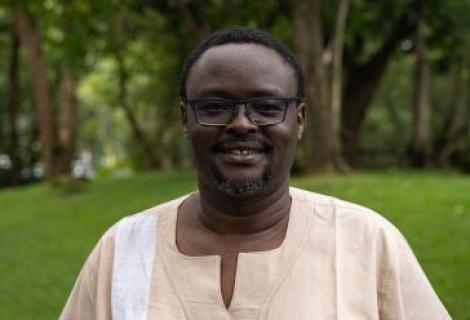Arthur Larok: Youth empowerment for climate justice: ActionAid takes the lead

Arthur Larok: Youth empowerment for climate justice: ActionAid takes the lead
Arthur Larok is Secretary General, ActionAid International, a global federation working in 46 countries to achieve social justice, gender equality and poverty eradication. He was previously Federation Development Director, ActionAid International for 4 years, Country Director, ActionAid Uganda for six years. He is also a member of the Transitions Assistance Practice Group (TAPG) hosted by the Institute for Integrated Transition (IFIT) in Barcelona, as well as Carnegie Endowment for International Peace’s Civic Research Network (CRN). He holds a bachelor’s degree in Political Science and Sociology from Makerere University Kampala, Uganda and master’s in governance and Development from the Institute of Development Studies, Sussex, UK.
He has coedited a Book on Uganda’s Civil Society and authored several papers, including ‘Protecting the Tree or Saving the Forest’: A Political Analysis of the Legal Environment for NGO Operations in Uganda” (2009) and ‘Uganda’s New Civic Activism: Beyond Egos and Logos’.
Why do you think we should care about climate justice? Climate justice is a matter of utmost concern that demands our attention. It has a profound impact on the poorest and most marginalized groups, especially women, who bear the brunt of climate change. Their lives and traditional ways of living are at risk, exacerbating the cycle of poverty they face. At its core, climate justice is a question of human rights. It is crucial to hold accountable those responsible for contributing to the current dire state of our planet in order to safeguard the lives and dignity of those already affected or at risk due to climate change. The goal of climate justice is twofold: to prevent disproportionate harm caused by climate change on vulnerable groups and to provide them with the necessary resources to adapt to its effects. It also entails holding individuals responsible for their role in climate change accountable, urging them to take action to reduce their emissions. By promoting fairness, equity, and accountability, climate justice aims to address the challenges of climate change and its consequences comprehensively.
What types of strategy should ActionAid International build to put pressure on big investors who finance toxic agribusiness and fossil fuels-based impacts? ActionAid International can employ various tactics to exert pressure on major investors supporting harmful agriculture and fossil fuel-related activities. These tactics encompass engaging in evidence-based policy dialogues with both state and non-state actors, including the private sector. They involve establishing agencies within impacted communities to foster the movement for climate justice. Encouraging civil society movements to exert pressure on national governments, facilitating the participation of communities, national governments, and activists in relevant global forums to advocate for divestment, demonstrating solidarity with climate activists, and engaging in legal battles are all part of the strategy. Furthermore, it is crucial for ActionAid International to prioritize the dissemination of knowledge concerning the detrimental impacts of toxic agriculture and fossil fuel-related consequences on the environment and human beings. This can be achieved through education campaigns and targeted lobbying efforts directed at decision-makers and the wider public. Collaborating with other groups and stakeholders is also essential for generating innovative solutions that mitigate the effects of climate change and promote sustainable development.
How is ActionAid International advocating for the economic development of countries by transforming extractive practices into regenerative methods? ActionAid International is actively engaged in advocating the transformation of extractive methods into regenerative approaches, with the aim of fostering economic growth in nations. One of our primary objectives is to advance agroecology, which encompasses holistic and environmentally beneficial farming practices. Moreover, we strive to encourage the adoption of sustainable energy technologies to reduce reliance on fossil fuels and combat climate change. Recognizing the pivotal role of women in building resilient communities and driving economic progress, we focus on empowering women-led initiatives for community resilience. ActionAid International ensures the integration of green, inclusive, and resilient development principles in its initiatives and endeavors, prioritizing sustainability and long-term well-being. We collaborate with governments to formulate effective policies that support regenerative economic practices.
What do you think should be done to mobilize youths who may not yet be aware of the importance of climate issues across the globe? There are various initiatives that can be implemented to engage young individuals who may not fully comprehend the significance of global climate challenges. Firstly, it is crucial to emphasize that climate change is a concern for future generations and that it directly impacts their rights. Secondly, integrating climate change education into the formal education system is essential. By incorporating climate-related themes into the curriculum, young people can develop a deeper understanding of the issue and its relevance. Empowering youth is vital as it enables them to comprehend the impact of climate change in their own surroundings. One approach to achieve this is by providing young people with opportunities to conduct their own research on the effects of climate change. It is also crucial to facilitate access to local, national, regional, and global forums to allow young people to express their concerns, contribute to conversations, and participate in discussions on climate change at all levels. Lastly, fostering South-South cooperation can encourage collaboration and shared learning among young people worldwide, while also promoting solidarity in the pursuit of climate justice.
This article was published in The Annapurna Express. (Click here to find the article link)